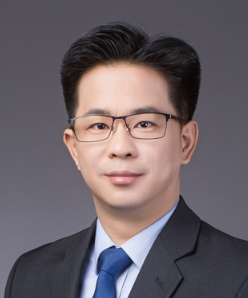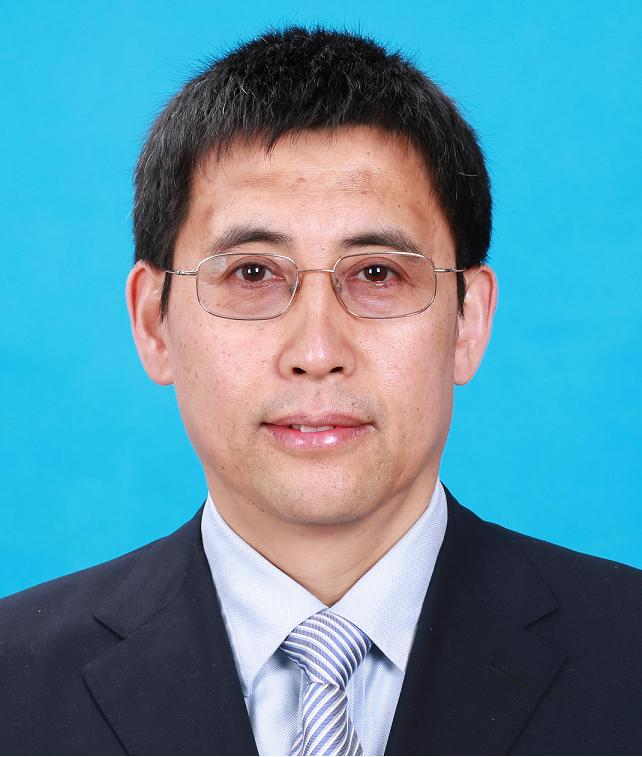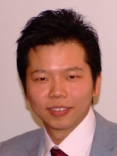
 | Prof. Xingjian Wang Beihang University, China 王兴坚,教授,北京航空航天大学
|
Xingjian Wang, professor, vice dean of School of Automation Science and Electrical Engineering, Beihang University. He received his Ph.D. and B.E. degrees in Mechatronic Engineering from Beihang University, China, in 2012 and 2006, respectively. From 2009 to 2010, he was a visiting scholar in the School of Mechanical Engineering, Purdue University, West Lafayette, IN, US. He is currently with the School of Automation Science and Electrical Engineering, Beihang University, Beijing, China. His research interests include nonlinear control for mechatronic systems, fault diagnosis and fault-tolerant control, biomechatronics and bio-inspired robotics. He has published over 200 papers. His research has been supported NSCF and other grants in China. He is the Secretary-General of Industry Committee of Fluid Power Transmission and Control Institution (FPTCI), China Mechanical Engineering Society (CMES), the Deputy Director-General of Organization of Aviation Utility Systems (AUS), Chinese Society of Aeronautics and Astronautics (CSAA). | |
Speech Title: Health Assessment, Fault Diagnosis and Fault-tolerance Control for Aircraft Control System Abstract: According to the control command of the pilot or the autopilot, the aircraft control system drives the aircraft rudder through the servo actuator to realize the aircraft attitude and flight trajectory control. It can be seen that the healthy service of the aircraft control system directly affects the flight safety and is a very critical airborne system. In order to realize the highly reliable and healthy service of the aircraft control system, the health status assessment and remaining useful life prediction of the key components of the aircraft control system, the key technology of fault diagnosis for the airborne hydraulic system, and the high safety hierarchical active fault-tolerance control strategy were carried out to effectively improve the healthy service capability of the aircraft control system. | |
 | Prof. Richard Yang Western Sydney University, Australia Prof Richard Yang joined Western Sydney University in January 2012 as Associate Professor of Mechanical Engineering and Smart Structures and he was promoted as Professor in 2018. Prior to this, Richard was holding the position of Senior Lecturer in Mechanical Engineering, the School of Engineering, Deakin University (Deakin). He also has worked for a couple of years each in the University of Sydney (USyd) and Korea Advanced Institute of Science and Technology (KAIST) as post-doc research fellow after he finished his PhD in Mechanical Engineering in the University of Hong Kong (HKU) in 2002. He was awarded the Graduate Certificate for Higher Education by Deakin University in 2008. In research, Prof Yang is an internationally recognised research leader on fields of research include Advanced Manufacturing, Additive Manufacturing (3D printing) of metals, polymers and composites, Advanced Engineering Materials & Structures, Circular Manufacturing & Circular Economy, Defence Technology, Industry 4.0, Machine Condition Monitoring (MCM) & Structural Health Monitoring (SHM), Metal Forming, Metal Surface Treatment, etc. He has been awarded over AUD$16m in competitive research grants, including 13 ARC grants (1 ARC Training Centre, 3 DPs, 3 Linkages, and 6 LIEFs), 2 CSIRO/NSF Convergence Accelerator on recycled plastic waste as well as more than 20 from government and/or industry. As for scientific publication, he has published more than 300 high-quality technical publications in top scientific journals, books, and conferences as a major contributor in his relevant fields of research across Mechanical, Mechatronic, Manufacturing, Materials, Aerospace, Civil, Defence, etc. As for external service, he is serving as assessor for Australian Research Council (ARC), editor board member, conference committee member, reviewer of international journals and conferences, examiner for Master and PhD thesis, etc. He is Editor-in-Chief of 2 scientific journals, Associate Editor of 2, and on the Editorial Board of 5. He has been on the ANSHM Executive and the Editor of ANSHM Newsletter since 2016. |
Speech Title: Investigation of material properties of additively manufactured high‑impact polystyrene Abstract: Fused Filament Fabrication (FFF), a process parameters-dependent manufacturing method, currently dominates the additive manufacturing (AM) sector because of its prominent ability to produce parts with intricate profiles, customise products, and minimise waste. Though the effects of FFF process parameters were investigated experimentally, recent research highlighted the importance of developing numerical modelling and computational methods on optimising the FFF printing process and FFF-printed materials.This study aims to investigate the tensile strength (TS) of FFF-printed high-impact polystyrene (HIPS) via devising a systematic testing and analysis framework, which combines experimental testing, representative volume element (RVE)-finite element method (FEM), rule of mixture (ROM), and artificial neural networks (ANN). HIPS samples are fabricated using FFF considering the variations of infill density, layer thickness, nozzle temperature, raster angle, and build orientation, and tested with standard tensile testing. The rule of mixtures (ROM) and its modified version (MROM) are employed to calculate the TS of longitudinally and transversely built samples at various infill densities, respectively, while an ANN model is constructed to investigate the effect of material anisotropy precisely. The optimal ANN architecture is built with five hidden layers with the number of neurons in each layer as 44, 82, 169, 362, and 50. Although both MROM and ANN perform well on the validation set, ANN exhibits superior accuracy with only a maximum error of 0.13% for training set and 11% for validation set. The combination of the RVE-FEM, MROM, and ANN approaches can significantly improve the FFF printing process of polymers for optimisation. | |
 | Prof. Youtong Zhang Beijing Institute of Technology, China 张幽彤,教授,北京理工大学
|
Zhang Youtong, PhD, Professor and Doctoral Supervisor at Beijing Institute of Technology. Formerly served as a director of the China Internal Combustion Engine Society, director of the Engine Laboratory, director of the Beijing Association for Foreign Exchange, member of the Standing Committee of the Beijing Institute of Technology Association for Science and Technology, and senior visiting scholar at the University of Wisconsin Engine Research Center in the United States. Current Director of the Clean Vehicle (Beijing Key) Laboratory, Director of the Beijing Internal Combustion Engine Society, Testing Technology Committee of the China Ordnance Industry Society, Scholar from Chutian, Hubei Province, and Director of the Academic Committee of the Hubei Key Laboratory of Pure Electric Vehicle Design and Testing. The current research direction is: 1. Lightweight security protection of heterogeneous networks within intelligent driving vehicles; 2. Design and driving of solar powered vehicles; 3. Optimization design and drive control of motors for new energy vehicles; 4. Intelligent agricultural electromechanical drive integration system and autonomous driving system; 5. Energy management and torque coordination control of hybrid electric vehicles. He has published 4 academic monographs, published over 160 academic papers, obtained 8 invention patents, and won 3 National Defense Science and Technology Progress Awards. I have been engaged in research and development of vehicle power drive control technology for a long time, and have led the design and development of China's first high-speed solar powered racing car, a common rail electronic control system for diesel engines, and a plug-in hybrid power system for vehicles. | |
| Speech Title: The Application of Carbon Fiber in Solar Car Body and Chassis Design Abstract: In today's automotive industry, energy conservation and environmental protection have become the core themes of its development. The development of new energy vehicles also faces the crucial issue of lightweighting. This study focuses on the field of solar-powered vehicles and conducts in-depth research on carbon fiber design technology. Starting from the perspective of material selection, suitable carbon fiber materials are carefully screened. In the design stage, innovative and reasonable structural designs are carried out. In terms of the process, the processing technology of carbon fiber is optimized to ensure quality and performance. And through a strict testing process, the achievements of the design and process are evaluated. Based on the above research, several solar-powered racing cars have been successfully developed. Verified by practice, after applying the carbon fiber design technology, these solar-powered racing cars have achieved significant weight reduction, effectively reduced energy consumption, and improved energy utilization efficiency, showing outstanding performance in energy conservation. It provides important technical support and practical experience for the development of solar-powered vehicles and also offers useful references for the lightweight development of new energy vehicles. | |
 | Prof. Junjie Ye Xidian University, China 叶俊杰,教授,西安电子科技大学 |
| Prof. Junjie Ye has been devoted to the research work on structural mechanics and health monitoring of composite materials for high-end equipment, and has been selected as one of the city's leading talents. His research achievements have won the second prize of Shaanxi Provincial Scientific and Technological Achievements, the first prize of Shaanxi Provincial Department of Education, the third prize of Science and Technology of China General Chamber of Commerce, the excellence prize of China Electronic Information Industry Innovation and Entrepreneurship Competition, and the second and third prizes of the 25th China Robotics and Artificial Intelligence Competition in Shaanxi Region for the guidance of postgraduate students. He is the executive chairman of “Academic Conference on Mechanics of Composite Structures in Extreme Environments”, a member of Composite Structural Design Committee of China Composites Society, an editorial board member of Mater Sci Adva Compos Mater, an editorial board member of Mater Sci Adva Compos Mater, an expert of Science and Technology Expert Pool of Jiangxi and Shaanxi Provinces, an expert of Peer Review of the Industrial Materials Department of the National Natural Science Foundation of China, and a member of Fault Diagnosis Committee of the Chinese Society of Vibration Engineering. He is also the director of Fault Diagnosis Committee of China Vibration Engineering Society. In recent years, he has presided over 3 projects of National Natural Science Foundation of China (1 each of surface and youth projects), 2 projects of Natural Science Basic Research Program of Shaanxi Province (1 each of key and youth projects), 4 projects of Basic Research Operating Expenses of Central Universities, more than 10 projects of joint projects of universities and enterprises, and participated in many projects of National Natural Science Foundation of China and 863 projects of China; and he has been published in the journals of Compos Sci Technol, Compos Part B and other journals, etc., Compos Sci Technol, Compos Part B and other journals, etc. He has published more than 70 SCI papers, been invited to give keynote speeches for 5 times, and applied for 15 invention patents. The research achievements are as follows: Innovative Achievements I: A new method of fine mechanics considering initial pore defects and three-dimensional random fiber arrangement is proposed, which elucidates the fine failure mechanism of high-end equipment composites and enriches the theory of fine mechanics. The research results have been highly evaluated by Academician Awaja of Italy, who believes that the constructed parameterized unit overcomes the problem of stress concentration at the interface, and can effectively predict the mechanical properties of random short-fiber composites and reveal the failure evolution law. Innovative results 2: The first three-scale collaborative modeling and solving technology for composite structures of high-end equipment is proposed, which reveals the failure mechanism of curved composite structures from microscopic damage to macroscopic fracture, and the research results are successfully applied to the damage assessment of wind turbine blades and star-carrying expandable structures, which provides a new way of thinking for the multiscale damage analysis of complex curved composite structures. Academician Batra of Virginia University, USA, believes that the proposed multi-scale method can effectively analyze the mechanical and failure problems of composite materials. Innovative achievement 3: Creatively developed a comprehensive simulation system for hydraulic pipeline endurance test of large aircraft wing under dynamic large deformation service environment, realized the test function under the extreme service conditions of 50m wingspan, 2628mm wingtip deformation, vibration frequency of 0.2~1.5Hz, and amplitude of 2~10mm, and efficiently accomplished the task of a certain large aircraft's Iron Bird test, which made an important contribution to the success of the development of large aircraft, and achieved remarkable results. It has made an important contribution to the successful development of large aircraft and achieved significant social and economic benefits. The research results were honored with the Second Prize of Shaanxi Provincial Scientific and Technological Achievements. | |
Speech Title: 高端装备复合材料结构多尺度失效机理研究 | |